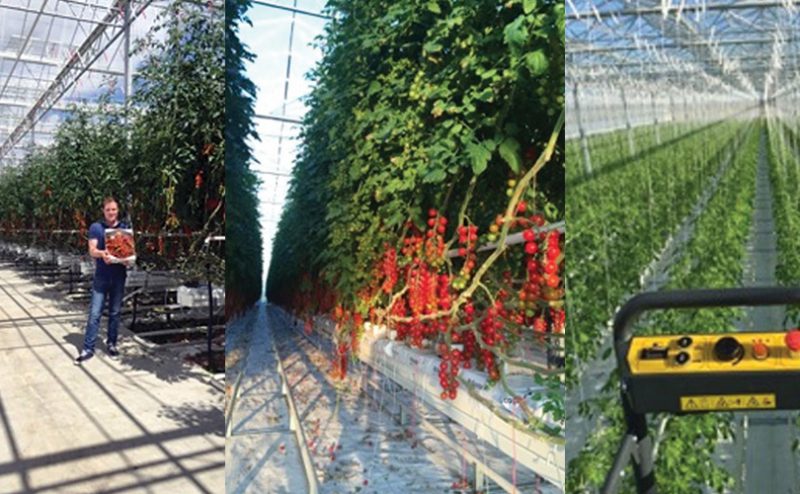
Only the tastiest tomatoes leave Flynns’ glasshouses in Swords. We travelled to North County Dublin and met up with Martin Flynn to get an insight into this exceptional third-generation family enterprise, which has been producing high-quality tomatoes for over six decades and is currently contracted to keep Aldi’s nationwide network of stores stocked and replenished with the finest tomatoes money can buy.
The utmost care and attention to detail – married with more than 60 years of experience – have seen Flynns Tomato Growers establish themselves as Ireland’s premier tomato producers. From their base in Bealinstown, Swords, County Dublin, father and son team William and Martin Flynn lovingly and skilfully nurture rich, bountiful tomato plants which in turn yield delicious, nutritious and vibrant produce.
Approximately 1,000 tonnes of tomatoes are produced annually and, through quality-driven multiple Aldi, Flynns’ tomatoes make their way into kitchens nationwide, from Ballybofey to Bantry Bay and Connemara to Clogherhead.
The reach and scope of the operation is almost breath-taking, so naturally optimum quality is a prerequisite. Nothing short of perfection will suffice and it is through meeting such exacting standards that Flynns Tomato Growers have become renowned as national leaders in their chosen field (or glasshouses, to be precise…).
The fact that Aldi have chosen Flynns as their sole tomato grower in Ireland speaks for itself. The exceptional father-and-son enterprise boasts an outstanding reputation for consistently producing quality, in-season produce. The Flynns put up their first glasshouse in 1966 and that one is still in use today. Another was built in 1974. Two years ago, a brand-new, state-of-the-art glasshouse was built on the farm to facilitate the largescale growth of tomato vines and ensure delivery of fresh, quality fruit to Aldi stores all year around. In keeping with the ongoing growth and evolution of this business, another new greenhouse is in the works and will deliver its first crop in 2017.
“The family tradition of growing tomatoes goes back to the early 1950s,” Martin Flynn confirms. “My grandfather and grandmother, Willie and Angela Flynn, grew potatoes, grains and tomatoes and my dad and uncle – William and Jimmy – took over in the late 1970s.”
Today, Martin and his father look after the tomato growing side of the family business, while Jimmy focusses on the 400-acre grain production business. The family also store and dry grain for neighbouring farmers and feed companies.
The last few years have seen significant investment in securing the long-term efficiency and sustainability of one of Ireland’s leading tomato growing operations. “When the new glasshouse is complete in December / January, we will have five acres in total between new glass and old glass,” Martin continues. “Going forward, around 70% of our tomatoes will be grown in the two new glasshouses.”
While Flynns were always ahead of the game, the genesis of the two new glasshouses takes their business to the next level, embracing renewable energy and bringing efficiencies to unprecedented new heights. As well as offering significant savings in terms of fuel, fertiliser and labour, the new units provide a 40% increase in output. A biocontrol system is in place and old plants are left on the ground to become natural compost. Pollination in the glasshouses is done naturally by Irish bees.
“It’s as efficient as it could be,” Martin confirms. “The new glasshouse is powered by gas and all the CO2 from the boilers goes into the old glasshouses to boost growth, so we are carbon neutral. All our water is also recycled and you don’t have much waste. So we can continue to produce very high-quality tomatoes at a reduced cost.”
All the tomatoes are grown under glass and Flynns have been supplying Aldi for four years. They had a stand in Aldi’s tent at this year’s National Ploughing Championships in September and have featured in the multiple’s television ads and posters.
Having initially had a three-year contract, Martin signed a new long-term agreement in 2015. Production is now at peak level, with a number of different varieties produced, including sunstream, piccolo cherry tomatoes, vine tomatoes and stunning, colourful rainbow blend hybrids.
“Aldi is our main customer, although we still sell into a few local stores as well as the local markets,” Martin notes.
Regarding the traits that have seen the business thrive over the years and decades to emerge as one of the country’s largest and most progressive tomato growers, Martin believes a number of key strengths have combined to give Flynns Tomato Growers the edge:
“Quality, sustainability, experience and taste are all vitally important,” he states. “It has to be a high-quality tomato, it has to taste great and it has to be sustainable. You need all of those qualities. If you fall short in one area, then that won’t be good enough. Taste and quality give us an advantage over imported tomatoes and our produce goes to market fresher.”
To coincide with the impending arrival of the new glasshouse, a new packing house will also be ready early next spring and 2017 will see Flynns complement their five full-time workers with up to 20 seasonal employees during peak growing season, which runs from April through to late November. The glasshouses are then cleared out and a new crop is planted each January, using seeds purchased from a propagator in England.
While it’s one thing growing supreme quality tomatoes, it’s a major challenge to do so in a commercially-viable manner. How have Flynns managed to keep the business profitable? “You have to be very efficient and grow quality crops,” Martin concludes. “You need to find the right balance between efficiency and productivity, whilst making sure that you produce tomatoes of the highest quality.”
Before I left Swords, Martin kindly gave me some complimentary tomatoes to take home. They didn’t see the following day!
Flynns Tomato Growers.,
Bealinstown,
Swords,
County Dublin.
Taken from Irish Tractor & Agri magazine Vol 4 No 8, October 2016